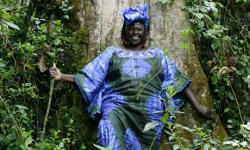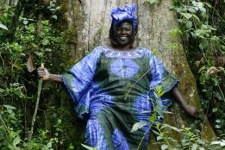Heaven is Green - Celebrating the life of Wangari Maathai

Wangari Maathai
It is a great tribute to Wangari Maatthai, who died on Sunday aged 71, that her name was one of the worldwide trends on Twitter yesterday. Already famous for founding Kenya's Greenbelt Movement which planted more than 30 million trees, her name went global in 2004 when she won the Nobel Peace Prize for her work to protect the environment and ensure sustainable development in Africa. She was the first environmentalist and the first African woman to receive the honour. Wangari provided livelihoods for tens of thousands of African women, helping them earn much-needed income from their seedlings and creating a ready source of firewood, fodder, building material, and even food from fruit trees that they control. Internationally, she worked with the UN and others to create a world based on ecological integrity, social and economic justice, democracy, non-violence, and peace. Wangari was the inspiration behind UN Environment Programme's Billion Tree Campaign, launched in 2006. She became a patron of the campaign, inspiring thousands of people across the world to plant trees for the benefit of their communities. To date, over 11 billion trees have been planted.
In interviews after receiving the Nobel prize she often spoke about her motivation and spirituality. Her Kikuyu family embraced Christianity when she was a small child and she was educated in Catholic mission schools before winning a scholarship to a Catholic university in Kansas to study biology - Mt St Scholastica College, which is now known as Benedictine College. Upon returning to Kenya, she was the first woman in East and Central Africa to earn a doctorate degree, obtaining it from the University of Nairobi in 1971. She said the nuns at the mission schools taught her "to serve people who are in trouble or disadvantaged" and "my teachers gave me a deep sense of justice and fairness that influenced me to work for human rights, and to desire human rights not only for myself but also for other people; eventually, this made me understand why it is very important to expand that concept of justice to other species."
Yet, despite saying she was moulded by people of faith, she also found shortcomings in the Church. As a young child in school she was taught that God was somewhere in Rome or somewhere in the sky. "I must say that religion was extremely superficial in the way that God was presented to us, because God was the way he appears in the Sistine Chapel, you know, by Michelangelo" she said. Yet, her Kikuyu background taught her to believe that God lived on Mount Kenya. "Of course, now we are in a completely new era when we are learning to find God not in a place, but rather in ourselves, in each other, in nature" she said. "When I look on Mount Kenya, it is so magnificent, it is so overpowering; it is so important in sustaining life in my area that sometimes I say, yes, God is on this mountain." When Wangari's Nobel prize was announced in 2004 she planted a celebratory tree in the shadow of Mount Kenya.
However, she continued to be inspired by texts of the world's great faiths, especially the Bible. "The more I have understood the importance of the environment in our lives and the importance of other species to our own survival, the more I have gone to the Bible" she once said. She felt that the loving God described in Genesis has given us a wonderful planet with all the essential things we need, and that many of the problems in Africa of diseases, poverty, hunger are not punishments from that loving God, but rather come from a human failure to utilize properly the resources that God has given us.
She liked reading the Book of Hosea Chapter 4, where the prophet is sent to the people of Israel to tell them they will perish, because they are so ignorant. She felt many people, particularly those in power in Kenya and some international bodies such as the International Monetary Fund, are ignorant in not recognising the linkages between the problems human society is facing and environmental degradation. She lamented that so often people in power work against the good of ordinary people. "So at least plant trees, for goodness sake" she said; "by planting trees you are not harming anybody".
She felt the destruction of God's creation should be a major concern for Christians. With the understanding we have now of the linkages between the environment, the way we govern ourselves and our resources, and the way we can live with each other in peace in this world, churches and the faithful should be in the forefront. "Theologians and religious leaders need to tell their faithful that they must do something for the environment and give them good examples of what they can do" she urged; "after all, this creation, this biodiversity, is the creation Genesis talks about in the first book".
She participated in several conferences on World Religions and Ecology, most especially in 1998 at the UN and the American Museum of Natural History in New York. She spoke eloquently at Fr Thomas Berry's memorial service in 2009 at the Cathedral of St John the Divine in New York. She delivered an inspiring video message in 2005 at the UN at the celebration of the 50th anniversary of Teilhard de Chardin's death. Her final book Replenishing the Earth: Spiritual Values for Healing Ourselves and the World (Doubleday, 2010) is a splendid summary of her vision for our world.
I saw her once in London, on her way into a packed hall for a speaking engagement soon after receiving her Nobel prize. She was a star in every way, from her radiant smile and wave to everybody present to the massive bow in her hair made of brightly coloured African cloth. But she was most at home among Kenya's rural women, planting seedlings or sitting under mature trees that she had planted. She once said that she thought heaven is green. I hope she is finding out that she was right.
















